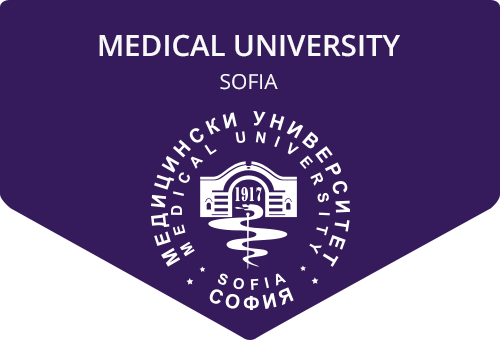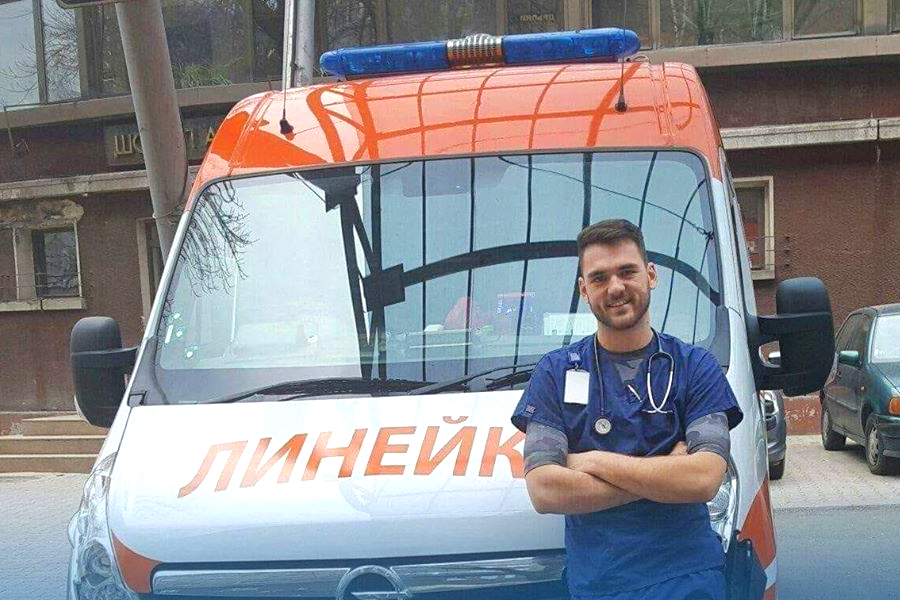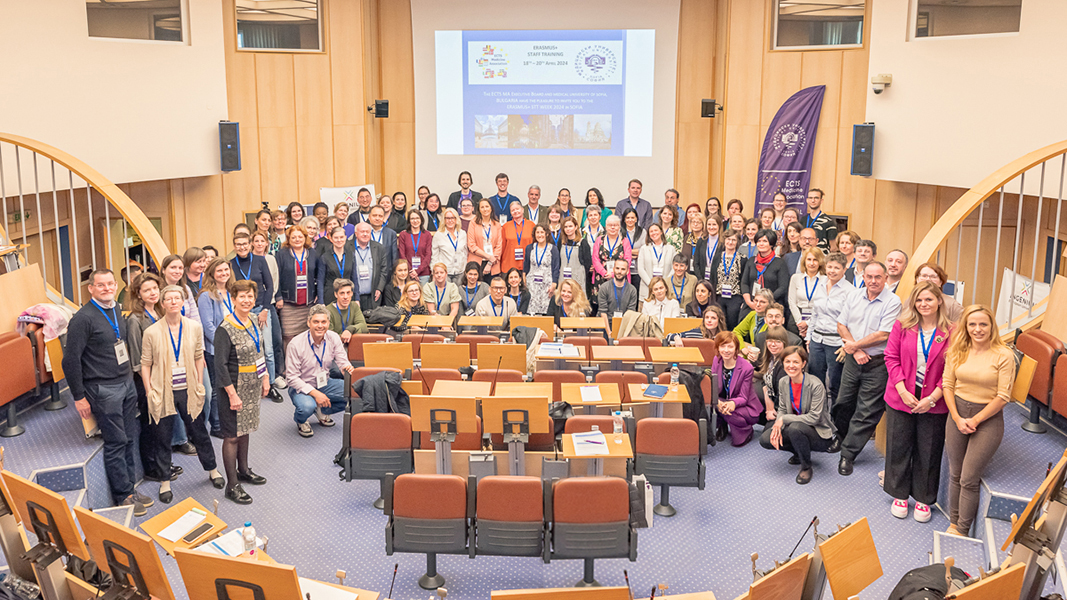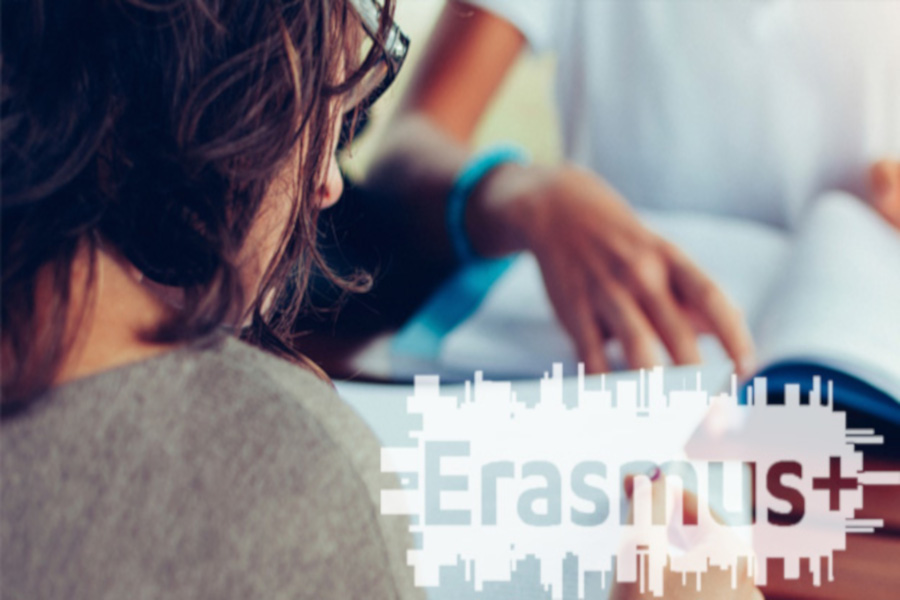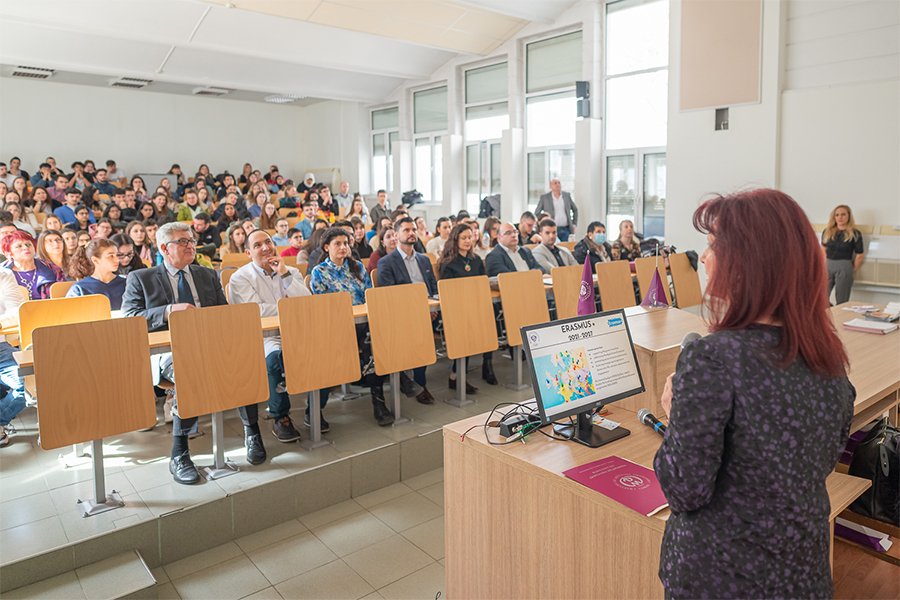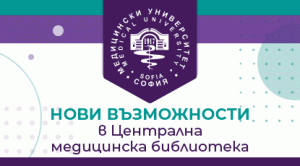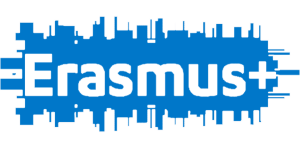in Others About Us, News
Teodor Tsankov is on the front line in the battle with COVID-19 – once as a paramedic in the Emergency Assistance in Sofia and the second time as a volunteer at the Alexandrovska Hospital, according to clinica.bg. The 26-year-old future doctor is not worried about his tasks and even feels adrenaline in his blood because the challenges and the demand for strong emotions are the salt in his life. Teodor is from Pazardzhik. He is a child of the Bulgarian transition to democracy, raised by his grandparents because his parents leave to work abroad. He graduated from a secondary school in Plovdiv and immediately went to the emergency assistance.
He started by participating in the Bulgarian Red Cross Youth as a part of their emergency teams, which train young people how to help someone affected by car accident, with blood loss or in other such emergencies. “As volunteers, we used to gather every Sunday, make dressings, and train different techniques. And now such training lessons are still existing in the BRC and they are very interesting ones”, says Teodor. In his words, this whole thing is motivated by the idea of good and to learn to help people.
“This was my vector of development– the youth emergency teams, I performed very well and decided to develop in this direction. So I went on. I worked in the Emergency assistance in Plovdiv as an ambulance driver, because at that time there was no vacancy for paramedics. Then I figured it was time to go up the stairs”, he says. And the long road to medicine begins. He first enrolled to study for a medical assistant, but soon discovered that this is not his calling. During this period he worked in clinics in Sunny Beach in the summer. “It was dynamic, different,” laughs the future doctor. He works intensively, but also emphasizes the lessons, and the following year he is admitted to the Medical University – Sofia, but with a specialty “Dental Medicine”. He then moved to the emergency assistance of a private hospital while continuing to study. “I met a lot of cool people there who persuaded me to stay in this specialty because it was better paid, this specialty does not suggest a stressful way of life, but one year passed and I moved to the specialty Medicine”, Teodor says. Thus, one big dream came true. He is now in his fifth year, working in the Emergency assistance and doing what he was aiming for – helping people. But it’s not enough. Currently, because of the Coronavirus crise, he enrolled as a volunteer in the emergency department of Alexandrovska Hospital, and is also engaged in the rehabilitation of football players.
He is still hesitant about what to specialize in – emergency medicine or anesthesiology and resuscitation, but the scales seem to tend to the latter. “Anesthesiology is the most difficult specialty in medicine, extremely intensive. This is where people are on the edge between two worlds – ours, the physical one, and the other for we read about in some books, but so far there is no evidence that it exists. The good thing that drives me is just that – the feeling of doing something like that and helping in a way that few people can do. This is indescribable, “says the excited Teodor.
I ask him whether he is afraid of being on the front line twice in the fight against the Coronavirus – as a paramedic and as a volunteer at “Alexandrovska” Hospital. And he tells me a more dangerous case, as in this incident neither he nor his colleague have been scared. “A few years ago there was a severe bus accident on the Thrace highway. A 15-ton bus had been turned upside down, and we lay under him to get a girl out of there. People who work in emergency assistance have no way of being scared and this may sound pompous, but I am not afraid. To do our job well, we are operated on by this feeling of fear, “comments the young man.
So far, he has met with at least 10 patients with COVID-19,most of whom have already been confirmed tests. He visited the addresses of patients who had an epidemiological history and had to be taken to the appropriate clinic. Such patients are also coming to the emergency assistance of the hospital. However, precautions are taken not to infect the medics, because otherwise they will not be able to help the sick.
Adrenaline is in Teodor’s blood, which is visible not only in his professional career but also in the choices he makes throughout his life. He likes to swim, climb mountains, jump with bungee. “I have set myself the goal, after I am going through the whole circus with the coronavirus, to jump with a parachute. I like things that make you feel alive. Life is increasingly showing us that we may have no next day and a person should make the most of it”, is the opinion of the future doctor. He loves fiction, but has lately read mostly medical literature. It follows the philosophy that it should not harm people. It helps them when needed because he thinks that not helping someone is not a good thing. He does not accept his work as heroism. “I am very far from that thought. Heroes are the people who do my job without being professionals, “says Teodor.
“I hope people’s lives and thinking will change in a positive direction after this pandemic. It is clear that the world is not going well and that this is the catalyst that will turn things around. But I deeply doubt it because people are greedy, sometimes bad, ”he says. As a lover of mountains and climbing, it is normal to have eco-friendly attitudes. He strives to plant at least 2-3 trees each year to help restore nature. He does not like the intention of deforestation in Strandja and this new development of the last preserved site of our Black Sea coast. He hopes the people there will not allow such madness. “Because without the forest, without the greenery, we are doomed to heat, and we can easily draw a purely biblical parallel and it’s clear what this is all about,” Teodor explains. He hopes to have another adrenaline rush after the purchase of two new emergency helicopters by the Bulgarian government. According to him, by this way the emergency teams will be able to reach everyone who needs help much faster. It is also hoped that the conditions in healthcare will improve in order for young doctors to stay working here, rather than forcing themselves to work abroad. I am ready to work here, now the ball is in the state to decide whether it wants us or will oust us, says Teodor.
Lily Voinova’s Material – clinika.bg
